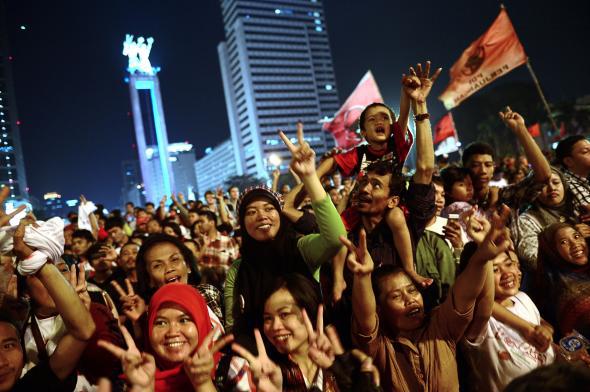Indonesia, which held a closely fought presidential election, doesn’t get all that much coverage here compared with China and India, which is unfortunate. It’s the world’s third-largest democracy, after the United States and India, home to one-fifth of the world’s Muslims, and on track to becoming one of the world’s largest economies, though one with a widening gap between rich and poor.
And this election appears set to be a transitional one. The front-runner has been Joko Widodo, an outsider politician running on an anti-corruption platform who has had a meteoric rise from local businessman, to mayor of the small Javan city of Surakarta, to governor of Jakarta.
As Tom Pepinsky explains, Joko has already distinguished himself somewhat from past Indonesian candidates by running with an existing party rather than forming his own: Indonesian politics are highly fractionalized due to the high number of small parties, making policymaking difficult on a national level. His victory could shake up the country’s party system.
Joko’s early lead faded after a smear campaign alleging that he is Christian and ethnic Chinese.
His main challenger is Prabowo Subianto, a former army general who led the country’s special forces under Suharto, the dictator overthrown in 1998. Prabowo presents himself as more of a charismatic strongman, able to unite the country in constrast with current president Susilo Bambang Yudhoyono.
If Prabowo, accused of human rights abuses under the Suharto dictatorship, gets into the office, the main question will become whether the country’s democratic institutions have strengthened enough in the last two decades to resist a slide back into authoritarianism.
If Joko gets into office, the question is whether his relatively thin résumé has prepared him for the tough challenges facing the country in the years ahead.
Official results won’t be released until July 20, but privately conducted early exit polls give a narrow edge to Joko, prompting him to declare victory. But Parbowo is claiming victory as well based on other polls.
Asia’s third superpower’s growth is an important and often overlooked story in international development, and it could still serve as either an exemplar or a cautionary tale about democracy in a large, developing, Muslim country. Amid the more dire crises around the world this month, it’s worth keeping an eye on.
